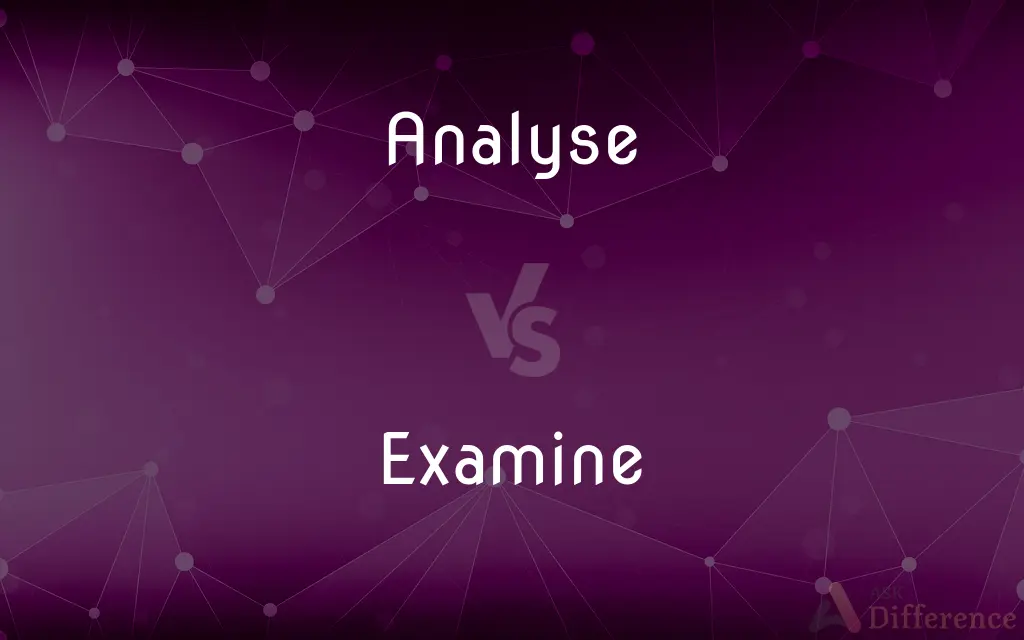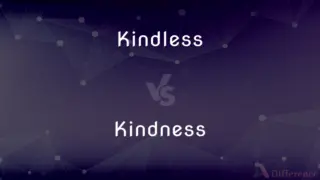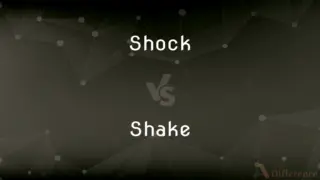Analyse vs. Examine — What's the Difference?
By Fiza Rafique & Urooj Arif — Updated on April 24, 2024
"Analyse" involves breaking information into parts to understand it better, focusing on interpreting data, while "Examine" means inspecting or looking closely at something to check details.

Difference Between Analyse and Examine
Table of Contents
ADVERTISEMENT
Key Differences
Analyse generally refers to a detailed examination with the intent of understanding and interpreting complex components of a subject. Whereas, examine is a broader term that implies a careful observation or scrutiny of an object or a concept to ascertain its nature or condition.
In the academic and scientific contexts, analyse is often used to denote a methodical and thorough approach to break down a study or problem into smaller parts to explore underlying mechanisms. On the other hand, examine can be employed in similar contexts but usually carries a less intensive connotation, focusing more on the act of investigating or inspecting without necessarily breaking it down.
Analyse is commonly associated with processes such as data analysis where the emphasis is on interpreting and drawing conclusions from data. In contrast, examine is more likely used in situations requiring physical verification, such as examining a patient or a piece of machinery.
The tools and methods involved in analyse often include statistical or logical techniques intended to derive deeper meanings or patterns. Conversely, examine often involves observational tools or straightforward inspection techniques aimed at assessing or verifying the current state or condition.
In business and technology, analyse typically drives decision-making processes, as it involves evaluating data to forecast trends and outcomes. Whereas, examine in these fields may refer to the assessment of processes, compliance, or systems without necessarily involving in-depth analytical techniques.
ADVERTISEMENT
Comparison Chart
Focus
Interpretation and understanding
Inspection and verification
Common Uses
Data analysis, scientific research
Physical checks, general assessments
Methods
Statistical analysis, thematic analysis
Visual inspection, interviews
Outcome
Insights and conclusions
Observations and status reports
Contextual Application
Often used in research and data-driven fields
Common in medical, technical, and legal fields
Compare with Definitions
Analyse
To examine methodically by separating into parts and studying their interrelations.
The scientist will analyse the sample under a microscope.
Examine
To inspect closely, often to assess fitness or condition.
The doctor will examine the patient for any signs of infection.
Analyse
To use analysis to solve or discern.
To diagnose the problem, one must first analyse the symptoms.
Examine
To consider a concept or an argument critically.
Philosophers examine fundamental questions about human existence.
Analyse
To perform a detailed examination for purposes of explanation and interpretation.
Analysts regularly analyse market trends to predict future economic conditions.
Examine
To test the knowledge or proficiency of.
The professor will examine the students at the end of the semester.
Analyse
In psychology, to examine mental and emotional processes.
The therapist will analyse the patient's dreams to understand underlying issues.
Examine
To observe carefully or critically.
Biologists examine wildlife behaviors in their natural habitats.
Analyse
In literature, to critically assess a text or a piece of writing.
Students are taught to analyse novels to appreciate literary techniques.
Examine
To investigate systematically.
Detectives examine the evidence to find the culprit.
Analyse
Variant of analyze.
Examine
To observe carefully or critically; inspect
Examined the room for clues.
Analyse
Standard spelling of analyze
Examine
To study or analyze
Examine a tissue sample under a microscope.
Examine the structure of a novel.
Examine one's own motives.
Analyse
Same as Analyze, Analyzer, etc.
Examine
To test or check the condition or health of
Examine a patient.
Analyse
Consider in detail and subject to an analysis in order to discover essential features or meaning;
Analyze a sonnet by Shakespeare
Analyze the evidence in a criminal trial
Analyze your real motives
Examine
To determine the qualifications, aptitude, or skills of by means of questions or exercises
Students are examined with standardized tests.
Analyse
Break down into components or essential features;
Analyze today's financial market
Examine
To question formally, as to elicit facts or information; interrogate
Examine a witness under oath.
Analyse
Make a mathematical, chemical, or grammatical analysis of; break down into components or essential features;
Analyze a specimen
Analyze a sentence
Analyze a chemical compound
Examine
To observe or inspect carefully or critically
He examined the crime scene for clues.
She examined the hair sample under a microscope.
Analyse
Subject to psychoanalytic treatment;
I was analyzed in Vienna by a famous psychiatrist
Examine
To check the health or condition of something or someone
The doctor examined the patient.
Examine
To determine the aptitude, skills or qualifications of someone by subjecting them to an examination
Examine
To interrogate
The witness was examined under oath.
Examine
To test by any appropriate method; to inspect carefully with a view to discover the real character or state of; to subject to inquiry or inspection of particulars for the purpose of obtaining a fuller insight into the subject of examination, as a material substance, a fact, a reason, a cause, the truth of a statement; to inquire or search into; to explore; as, to examine a mineral; to examine a ship to know whether she is seaworthy; to examine a proposition, theory, or question.
Examine well your own thoughts.
Examine their counsels and their cares.
Examine
To interrogate as in a judicial proceeding; to try or test by question; as, to examine a witness in order to elicit testimony, a student to test his qualifications, a bankrupt touching the state of his property, etc.
The offenders that are to be examined.
Examine
Consider in detail and subject to an analysis in order to discover essential features or meaning;
Analyze a sonnet by Shakespeare
Analyze the evidence in a criminal trial
Analyze your real motives
Examine
Observe, check out, and look over carefully or inspect;
The customs agent examined the baggage
I must see your passport before you can enter the country
Examine
Question or examine thoroughly and closely
Examine
Question closely
Examine
Put to the test, as for its quality, or give experimental use to;
This approach has been tried with good results
Test this recipe
Common Curiosities
What skills are necessary for effective analysis?
Skills such as critical thinking, statistical reasoning, and logical deduction are vital.
What is the primary goal of analysing a problem?
The primary goal is to break the problem down and understand underlying mechanisms.
Can examining lead to analysis?
Yes, initial examinations can lead to more detailed analyses.
Is analysing more detailed than examining?
Yes, analysing typically involves deeper exploration and interpretation.
How do the outcomes of analysing and examining differ?
Analysis often results in insights and theories, whereas examination provides observational data.
Why is analysis important in decision-making?
It provides a comprehensive understanding and predictive insights, crucial for informed decisions.
How does examining differ from analysing in a medical context?
Examining involves physical checks; analysing might involve interpreting complex data from tests.
Is examining always necessary before analysing?
Often, yes, as initial examinations can provide data for subsequent analysis.
Which professionals commonly engage in analysis?
Scientists, data analysts, and business strategists commonly engage in analysis.
What is the difference between examining a piece of art and analysing it?
Examining art involves looking at it critically, while analysing might involve understanding the symbolism, techniques, and historical context.
Are there tools specifically designed to aid in examination?
Yes, tools like microscopes or diagnostic software can aid in examination.
What is a common mistake when analysing data?
Overlooking context or misinterpreting data due to biases can be common mistakes.
Can I examine something without analysing it?
Yes, one can examine something superficially without engaging in in-depth analysis.
What role does examination play in education?
It helps in assessing knowledge and encouraging detailed observation.
How does technology influence analysis?
Technology enables more sophisticated, accurate, and faster analysis.
Share Your Discovery

Previous Comparison
Kindless vs. Kindness
Next Comparison
Shock vs. ShakeAuthor Spotlight
Written by
Fiza RafiqueFiza Rafique is a skilled content writer at AskDifference.com, where she meticulously refines and enhances written pieces. Drawing from her vast editorial expertise, Fiza ensures clarity, accuracy, and precision in every article. Passionate about language, she continually seeks to elevate the quality of content for readers worldwide.
Co-written by
Urooj ArifUrooj is a skilled content writer at Ask Difference, known for her exceptional ability to simplify complex topics into engaging and informative content. With a passion for research and a flair for clear, concise writing, she consistently delivers articles that resonate with our diverse audience.














































